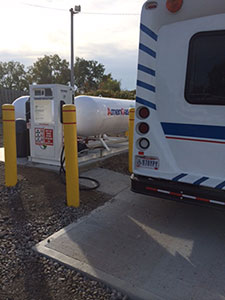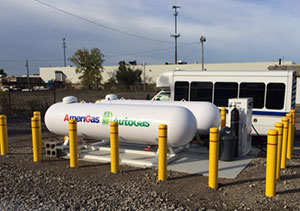Propane conversion runs smoothly for customized transportation company
Provide A Ride President Alan Groedel learned about propane as a fueling option through the Taxicab, Limousine & Paratransit Association trade group.

Provide A Ride is using 800 to 900 gallons of propane a day, six days a week for its fleet of vehicles.
Thanks to his knowledge of autogas, the Cleveland-based firm that runs government-funded specialized transportation programs was awarded a contract with the Greater Cleveland Regional Transit Authority (RTA).
Groedel turned to the alternative fuel because he wanted his proposal to reflect his company’s concern for the environment and control over fuel costs.
“The Cleveland RTA is running vehicles on propane, propane and gas, and electricity,” he says. “So propane helped make us look like a smarter partner to work with.”
Six months later, Provide A Ride is using 800 to 900 gallons of propane a day, six days a week for its fleet of about 45 bi-fuel vehicles.
Initially, the company’s paratransit vehicles and cargo passenger vans were gasoline only, but have since been converted to run on propane, as well.
“For a quantity buyer such as myself, with 40 to 50 vehicles running on propane, running 225 miles a day, and only getting about 12 miles per gallon, we buy a lot of propane,” Groedel says. “That being said, propane sells for close to $1.50 a gallon less than gasoline.”
Provide A Ride hired Icom North America to come to Cleveland and complete the conversions.
“It cost us more, but I think it was one of the best moves we made,” he says. “As a result of hiring them to do the installs, our implementation ran very smoothly.”
The Icom system requires no driver interaction, Groedel says. The driver sees the gauge that shows how much propane is in the vehicle, so there’s really no action the driver needs to take. As a result, Groedel says, his drivers required “extremely minimal training.”
“A driver could not tell at any one time, by vehicle performance, whether the vehicle is running on propane at that moment or gasoline,” he says.
The maintenance staff and technicians at Provide A Ride participated in an intensive, week-long training session, Groedel says, and it took close to three months for them to get fully comfortable in diagnosing and troubleshooting any issues.
Now, they are installing the conversion kits on their own as the company takes delivery of 10 new vehicles.
An on-site fueling station makes fill-ups convenient. The vehicles are filled with propane early in the morning. Drivers work eight-hour shifts and come back to the station mid-day where the vehicles are refueled and sent back on the road for another eight hours with a fresh driver.
It took almost three months to receive city approval for the fueling station on the Provide A Ride property, however. AmeriGas handled this aspect of the project, hiring architects and engineers to oversee the construction and design.
Provide A Ride drivers pull up to a pump that looks no different than a gasoline pump. To improve efficiency, a dedicated refueler is used so drivers do not have to leave their vehicles.
Information is gathered at the pump, making it easy to track mileage and propane usage that can then be captured in reports.
For someone who had never been involved with alternative fuels, Groedel is “extremely” happy his company now uses bi-fuel vehicles.
“First, propane allowed us to continue to keep a contract with a very progressive transit agency. I think it made a difference to them,” he says. “Secondly, it’s a cost savings. Propane is simply less expensive.”
Photos: AmeriGas


















I am a retired sheriff investigator for cook county Illinois. I have been speaking with companies in the field of converting Government Vehicles to Propane. With that in mind can someone contact me to see to discuss how your program works in more detail. I deal with hundreds of Police and goverment agencys.. 708-417-0229 Thank You